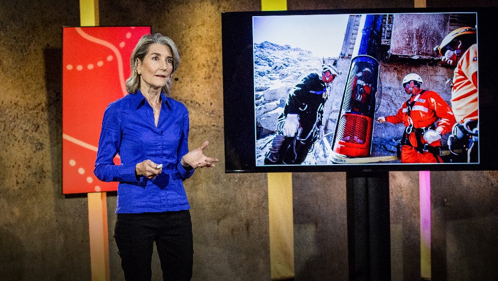DOP Update: Collective Success Hinges on Our Ability to Engage Others
By Jeffrey Myers, MD | December 27, 2018 | Department of Pathology Updates, Vol 4 (3.1)
Teammates,
Today brings a supplement to the Updates sent earlier this week (attached) to members of our Department of Pathology (DOP) and interested stakeholders regarding the power of self-assembling teams to change the world whatever the scale and scope of the problems with which we are confronted. This supplement is also [linked]as a PDF file to preserve formatting across mobile platforms.
 At 4:06 AM this morning I received the latest in a series of TED talks called THE BIG IDEA – 21 DAYS OF IDEAS INTO ACTION. It turns out it is focused on exactly the same topic as the self-assembling teams referenced on Monday, a phenomenon referred to as teaming by Amy Edmonson, the Novartis Professor of Leadership and Management at the Harvard Business School. Her TED page biosketch answers the question of why you should listen.
At 4:06 AM this morning I received the latest in a series of TED talks called THE BIG IDEA – 21 DAYS OF IDEAS INTO ACTION. It turns out it is focused on exactly the same topic as the self-assembling teams referenced on Monday, a phenomenon referred to as teaming by Amy Edmonson, the Novartis Professor of Leadership and Management at the Harvard Business School. Her TED page biosketch answers the question of why you should listen.
Amy Edmondson's work sheds light on the related questions of why teamwork is so critically important in today’s organizations and why it is so challenging.
Forgive me if too much for the holidays but this talk just felt like it was made for us and had to be shared!
The TAKE ACTION summary at www.TED.com says,
Too many of us are raised to compete -- spurring remarkable accomplishment but often impeding the collaboration and teamwork needed to address the world's most pressing challenges. To truly innovate, we need to work together -- across boundaries created by expertise, distance, and status. That's the promise of teaming. So now, look around you. Think about people's whose knowledge and skills are different than yours. How quickly can you discover the treasures they bring, share what you bring, and then team up to make something impossible happen?
In her 13: 08-minute talk Dr. Edmonson defines teaming as teamwork on the fly, reminding us that teaming is very different from the teamwork demonstrated by teams like the Ferrari Formula 1 pit crew referenced in Monday’s updates because in teaming the members are unable to practice in the same way. She defines teams in general as a stable bounded group of individuals who are interdependent in achieving a shared goal. Her observation is that teaming is increasingly the way in which we have to get work done in a world of ever-narrowing expertise. She references health care as an exemplar. She highlights professional culture clash as one of the barriers to teaming more effectively and identifies leadership as an essential ingredient for success. Edmonson elaborates on a special kind of leadership for successful teaming that begins with situational humility – the ability of leaders to be crystal clear that they do not have the answer. Combined with authentic curiosity, situational humility fosters an environment of psychological safety in which ideas can emerge, be heard, and be tested in ways that welcome failure as an opportunity to learn. She describes this formula as essential for overcoming what she refers to as a:
basic human challenge – it’s hard to learn if you already know.

 In the end, our collective success hinges on our ability to engage others in a culture that embraces the power of diversity from a place of genuine humility and curiosity that supplants scarcity with a mindset of abundance, celebrate our differences as our strength, and practices authentic inquiry as standard work. She summarizes that sort of humble authentic leadership driven by curiosity and interest in those who see things differently from ourselves by referencing Abraham Lincoln who said, “I don’t like that man. I must get to know him better.”
In the end, our collective success hinges on our ability to engage others in a culture that embraces the power of diversity from a place of genuine humility and curiosity that supplants scarcity with a mindset of abundance, celebrate our differences as our strength, and practices authentic inquiry as standard work. She summarizes that sort of humble authentic leadership driven by curiosity and interest in those who see things differently from ourselves by referencing Abraham Lincoln who said, “I don’t like that man. I must get to know him better.”
Thank you to those who shared your own ideas about collaboration and teamwork in response to Monday’s Update – your feedback and ideas are the things most meaningful to me in writing Updates. I hope you find today’s edition a useful supplement as we continue to understand the place, value and success factors important to effective collaboration and teamwork going forward.
It remains my hope for each of you that 2019 proves a year of possibilities, a year of wonder, a year of hope, and a year of unanticipated opportunities to make a difference.
HAPPY NEW YEAR!
 ON THE COVER
ON THE COVER
 ON THE COVER
ON THE COVER
 ON THE COVER
ON THE COVER
 ON THE COVER
ON THE COVER
 ON THE COVER
ON THE COVER
 ON THE COVER
ON THE COVER
 ON THE COVER
ON THE COVER
 ON THE COVER
ON THE COVER
 ON THE COVER
ON THE COVER
 ON THE COVER
ON THE COVER
 ON THE COVER
ON THE COVER
